This article on Feng Shui for Home is so thorough! Very detailed and comprehensive, highly recommended!
1. Feng Shui of the Living Room
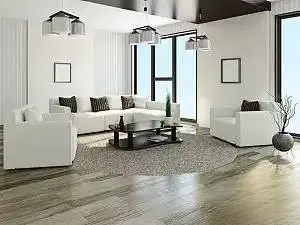
In terms of home feng shui, the feng shui of the living room is closely related to the fortune of the whole family. Living room feng shui has always been a concern of everyone. Among them, living room feng shui is a kind of indoor feng shui.
1 Key points of Feng Shui layout in the living room
Feng Shui layout of the living room:
1. The living room is best located in the front half of the house, near the front door, to directly absorb air flow. If the living room is accessed through a corridor, the corridor should be kept clean and well-lit.
2. The first thing you should see after entering the front door is the living room, while the bedrooms, kitchen and other spaces should be located at the back of the house to facilitate wealth accumulation.
3. The layout of the living room should preferably be square or rectangular. If there are protruding corners, you can place bonsai or furniture to resolve them.
4. Whether it is a side-through living room or a middle-crossing living room layout, smooth entry into or passage through the living room should be ensured.
5. The living room space should not be narrow. A spacious feeling can bring a relaxed state of mind and a happy mood.
6. The living room space cannot be low. Regardless of whether an artificial ceiling is installed, the height of the space must be ensured.
2 Feng Shui Taboos in the Living Room
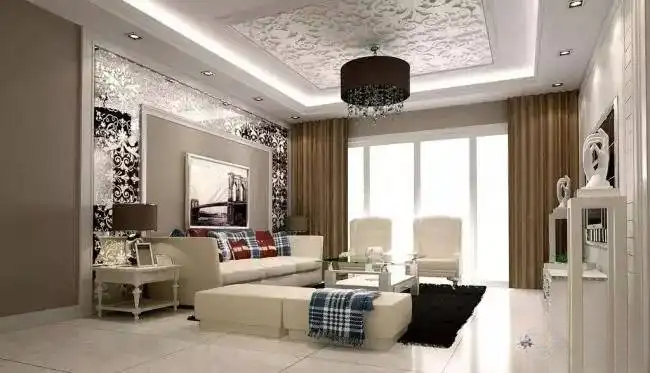
The feng shui of the living room is very particular, it affects the fortune of the family. The taboos of the living room include the following:
1. The living room should not be dark
Avoid having too many potted plants or plants on the balcony to prevent them from blocking the light. A bright living room brings prosperity to the family.
2. The living room floor should not be uneven
The living room floor should not be uneven, and there should not be too many doors or create differences in height. Some living rooms use a high and low level partition design to make the floor height have obvious changes.
3. The living room cannot be a traffic line
The living room is a place where prosperous energy gathers and should be stable. It should not be located within the traffic flow. If the living room is located within the traffic flow of the passage, it will easily disrupt family gatherings or guests, affecting the homeowner's career and interpersonal relationships.
4. The living room should not have a beam pressing down on the top
If there are beams on the ceiling of the living room, it will give people a feeling of oppression. Sitting under the beams will easily cause mental tension and bad luck.
5. It is not advisable to hang paintings of ferocious beasts in the living room
Avoid hanging ferocious animals such as dragons, tigers, and eagles in the living room. If you must hang them, their heads must face outward to serve a defensive purpose, otherwise they will bring unexpected disasters to the family.
3 Ways to Break the Feng Shui of Your Living Room
In terms of home feng shui, the feng shui of the living room is crucial to a family's fortune and harmonious relationships. It's crucial to ensure smooth flow of qi throughout the living room, avoiding any dead spots where foul air can accumulate. The living room is the primary venue for family life, socializing, and entertaining. Therefore, good living room feng shui can bring happiness to the entire family. The living room is also the ideal room for fostering life's eight desires, as everyone uses it. Therefore, good living room feng shui benefits every family member.
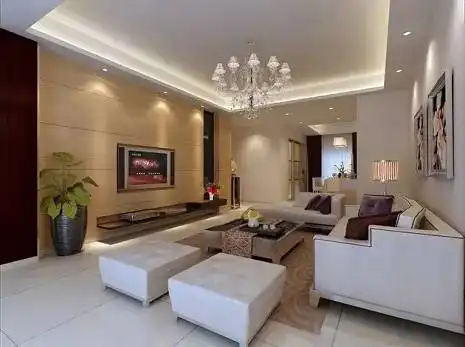
First move: position
The living room is best located in the front half of the home, near the front door, to directly absorb the chi entering through the door. If a hallway is required to reach the living room, it must be kept clean and well-lit to avoid obstructing the flow of chi into the living room. If the house is designed as a mezzanine, the living room should be located on the lower level.
The second move, pattern
The ideal living room layout is square or rectangular. Seating areas should avoid facing corners, and sofas should not be placed above beams. If a protruding corner poses a threat, place a bonsai or other furniture to mitigate the problem. If the living room is L-shaped, use furniture to divide it into two square areas, treating them as separate rooms. For example, one area could be a reception room, the other a living room. Alternatively, hang a mirror on the wall to symbolically fill in the missing corner. Then, consider the room as a complete whole and determine its center point.
Tip 3: Adjust your home decor
Sharp objects, such as swords, firearms, medals, and stuffed animals, should not be hung on the wall. These items can generate negative energy and lead to arguments or violence. Similarly, lamps or decorative items with sharp corners should be avoided.
Tip 4: Smooth airflow
Make sure that air flows smoothly in the living room, and there should be no dead corners where foul air can accumulate.
The fifth trick: Feng Shui decoration
The layout of your living room depends primarily on the occupant's lifestyle and aesthetic preferences. The placement of any feng shui charms should be based on the eight life desires and the orientation of your birth hexagram. Consulting a professional feng shui master is recommended.
The sixth move: eight directions
First, draw a floor plan of your living room, carefully marking the locations of doors and windows. Divide the room into nine equal parts and mark the corresponding directions for the eight life desires. Draw the center point of the living room, then use a compass to determine the orientation of the room, especially the location of the front door. Then, follow the principles of the Five Elements' mutual generation and mutual restraint to activate the eight life desires.
The seventh move, due north, career luck, black and blue
Check the layout of the due north in your living room. Due north represents career luck and is associated with the water element, so the preferred colors are blue or black. Placing water-related items in this direction can aid career luck, such as fish tanks, landscape paintings, and waterwheels. Black metal ornaments are also acceptable, as metal generates water.
The eighth move, due south, fame, red
Good feng shui in the south direction can bring fame and recognition to the family, especially to the head of household responsible for the livelihood. The south is associated with the fire element, and the preferred color is red. Pictures of phoenixes, flaming cranes, or sunrises are suitable. Red carpets or red wooden decorations (as wood generates fire) are also suitable. Installing lighting in this direction can further enhance reputation. If you must place a mirror in this position, make sure it's a small one, as mirrors are associated with water, and water extinguishes fire, negatively impacting reputation.
The ninth move: East, health luck, green
The east direction is associated with the health of the residents. Placing lush plants in this area can promote the health and longevity of the family. Water-related items or landscape paintings are also helpful, as water nourishes wood.
2. Bedroom Feng Shui
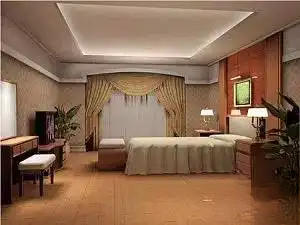
Bedroom Feng Shui is an important part of residential Feng Shui. We spend almost one-third of our lives in the bedroom.
1. Feng Shui taboos in the bedroom
The bedroom is a private and important room in the home. Mastering bedroom feng shui can bring both physical and mental well-being to both spouses and a fulfilling life. Understanding bedroom feng shui taboos will undoubtedly benefit family, career, and future life. Failure to do so could negatively impact one's life and health.
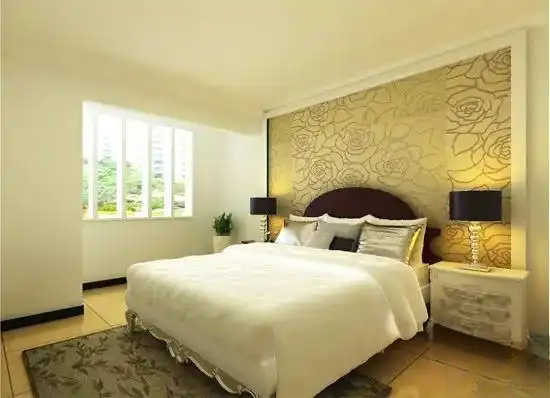
Taboo 1: Too many electrical appliances, especially the TV facing the foot of the bed
In feng shui, having too many electrical appliances in the bedroom is considered a "fire house" and can negatively impact health. Modern medical theory also indicates that radiation from electrical appliances can be detrimental to human health. The feet are a second heart, and if a television in standby mode is facing the foot of the bed, its radiation can significantly impact the meridians and blood circulation in the feet.
Taboo 2: Feng Shui theory believes that the bathroom belongs to the water element, which has a heavy yin energy and can easily cause discomfort in the waist and kidneys.
A survey found that residents with bathrooms in their bedrooms, especially those with bathrooms directly opposite the bed, do experience a high incidence of lower back pain. This is because no matter how good a bathroom is, it cannot change its inherent nature as a waste disposal facility, resulting in poor air quality and increased moisture after showering. If the bathroom door faces the bed, it not only easily dampens the bed but also affects the bedroom's air quality, leading to lower back pain over time and increasing the detoxification burden on the kidneys.
Experts recommend: Place a few potted foliage plants in the toilet, or add a screen between the bed earrings and the bathroom door as a cover.
Taboo 3: Area exceeds 20 square meters
Ancient feng shui theory states that "a large house with few people is an ominous place" and that "a large house attracts people." Therefore, even the emperor's bedroom would not exceed 20 square meters.
In fact, the "human energy" mentioned in Feng Shui is what we later discovered as the "human energy field." The human body is an energy body, constantly radiating energy, much like an air conditioner in operation. The larger the room, the more energy it consumes. Therefore, an overly large bedroom can lead to excessive energy consumption, resulting in weakened immunity, lethargy, impaired judgment, poor decision-making, and even "bad luck" and illness.
Taboo 4: Balcony or French windows
Bedrooms with balconies or floor-to-ceiling windows also increase energy consumption during sleep, leading to fatigue and insomnia, as glass structures cannot retain body heat. This is similar to the fact that sleeping outdoors can increase the risk of illness.
Experts recommend: Choose a room without a balcony or floor-to-ceiling windows as a bedroom, or hang thick curtains on the balcony and floor-to-ceiling windows to cover them.
Taboo 5: Large windows facing east or west
Feng shui masters point out that sleeping in a room with large east- or west-facing windows is more likely to cause "blood disasters" due to "light evil." This is because the strong morning and afternoon sunlight in east- or west-facing rooms can cause excessive light in the bedroom, stimulating the nerves and disrupting rest, leading to insomnia and making people less focused, impulsive, and irritable.
Experts recommend choosing a bedroom with small windows facing north or south. If you already live in an east- or west-facing room and switching is not possible, be sure to close the curtains when appropriate.
Taboo 6: There is a chandelier on the ceiling directly above the bed
Feng shui calls a chandelier directly above the bed "chandelier pressing on the bed," considered to be "deadly energy" and detrimental to health. Modern psychological research has found that having a chandelier directly above the bed can indeed create psychological implications, increase stress, and affect endocrine function, leading to a range of health problems including insomnia, nightmares, and respiratory emergencies.
2. How to Place a Bed in Your Bedroom
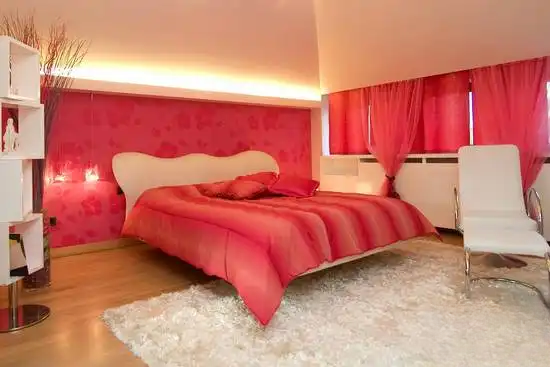
Since the bed occupies an important position in a person's life, the choice of bed and the placement of the bed are extremely important. Generally, the following aspects need to be considered:
1) When it comes to the bed itself, consider its length and width to ensure it's comfortable for the body. Ensure the surface is flat and provides adequate support and comfort. The bed should be slightly above the sleeper's knees, but never close to the floor. Keep the bed's floor clear of debris, as this can create a lack of ventilation and lead to moisture, which can cause back pain.
2) Regardless of where the bed is placed, it should be visible to the bedroom door and window, allowing bright sunlight to reach the bed. This arrangement helps absorb energy from nature and is more beneficial to health.
3) The bedroom door should not face the bed directly, and the head of the bed should not be against or facing the door. This is because the doorway is also a drafty area, and sleeping facing this drafty area will inevitably affect people, leading to illness or restlessness. Furthermore, since sleep requires a peaceful environment, a bed facing away from the door can easily be disturbed and startle people. A bed is designed solely for sleeping and should ideally be quiet and safe. Doors, on the other hand, are constantly moving, opening and closing. Placing them directly against (or across from) a doorway can lead to problems and is therefore not recommended.
4) It's best to choose a bed facing north or south, corresponding to the Earth's magnetic field. Sleeping head-on south or north is beneficial to health because the aorta and great veins are most important in the human circulatory system, and their orientation aligns with the head and feet. When sleeping in a north-south orientation, the orientation of the aorta and great veins, the direction of the body, and the direction of the Earth's magnetic field align. Facing west is not recommended because the Earth rotates from west to east. If the head is facing west, blood will rush directly to the head, making sleep less stable. Sleeping head-on eastward, however, creates a sense of peace.
5) The head of the bed should be solid, not hollow. It should be against a wall, not a window. If the bed is not against a wall, it must have a headboard to prevent the head from being empty. There should also be no toilet or kitchen behind the bed.
6) Do not have a beam pressing against the bed, as this can create a sense of oppression and harm physical and mental health. This also includes not having a beam pressing against the bedroom door, not hanging a split air conditioner indoor unit above the pillow, and not hanging a chandelier directly above the bed. These all fall under the category of a beam pressing against the bed.
According to Feng Shui, any visible beam in a room is considered inauspicious and should be shielded by a ceiling. This applies not only to beds. Having a beam overhead can subconsciously create a sense of oppression, which can negatively impact your mental well-being, so caution is advised.
7) Avoid having a mirror facing your bed, as waking up in the middle of the night can easily startle you with the image in your surroundings, leading to restlessness and dizziness. If there is a mirror facing your bed, cover it with decorations at night or turn it toward the wall. If you can fit the mirror inside your bedroom wardrobe, this allows for flexible use.
8) The bedside table should be higher than the bed. It is conducive to improving sleep quality. The height of the bed should not exceed 22 inches.
Fengshui of Yang Houses believes that a bed that is too high can easily lead to disasters. Even from the perspective of the real moon hand, a high bed is also inconvenient and easy to fall from, making it unsafe.
9) The bed should be parallel or perpendicular to the bedroom wall to avoid abrupt indoor movement lines and a sense of instability.
3 Feng Shui considerations for the master bedroom
The master bedroom is different from the second bedroom. It is the main place where the owner of the house sleeps. Therefore, the feng shui of the master bedroom is related to the health and fortune of the owner of the house.
So, what are the Feng Shui considerations for the master bedroom and what are the Feng Shui taboos for the bedroom?
Feng shui precautions for the master bedroom, and one of the bedroom feng shui taboos: The master bedroom is more suitably located at the back of the entire house, so that it appears to have a sense of control over the entire house. Usually, important people are located at the back, so that it is easier to command the overall situation. The principle is the same.
Feng Shui considerations for the master bedroom, and the second Feng Shui taboo for the bedroom: If the master bedroom is in the northwest, it is the best choice. The master and the mistress both live in this position, which symbolizes harmony between husband and wife, a harmonious family, and smooth roads.
Master bedroom feng shui considerations: Bedroom feng shui taboo number three: The master bedroom should not be too large, such as having a room within a room or being larger than the living room. A bedroom that is too large, too bright, or has too many windows can easily dissipate feng shui energy, diminishing yang energy. This can lead to the generation of deep yin energy, and excessive yin energy can lead to a cold relationship, disharmony, and arguments between the couple. Conversely, a concentrated qi fosters a deep and loving relationship. Generally speaking, the size of a master bedroom is determined by the space in front of the bed, which should not exceed the length of the bed.
Master bedroom feng shui considerations: Bedroom feng shui taboo number four: Avoid sharp, crooked, or overly prominent pillars in the master bedroom. This can easily lead to arguments and disputes over trivial matters, affecting harmony between the couple. If a new home has these issues, consider modifying the layout during renovation to avoid these negative feng shui effects.
Feng shui precautions for the master bedroom, and the fifth taboo of bedroom feng shui: the master bedroom should not be smaller than the children's room. The size of the space also symbolizes the status of superiors and subordinates. If the children's room is larger than the master bedroom, it seems that the sovereignty falls on the children, and the parents have to listen to the children, and the adults' status in the family is not prominent.
Feng shui precautions for the master bedroom, and the sixth taboo of bedroom feng shui: the master bedroom should not be too dark. Although feng shui says [bright hall and dark rooms], if the room windows are too small or non-existent, the air will not circulate, sunlight will not be able to enter easily, the yang energy will be insufficient, and the qi will be stagnant, which can easily cause headaches, drowsiness, and bad temper.
Master bedroom feng shui considerations: Bedroom feng shui taboo number seven: The master bedroom door and the children's bedroom door are too close to each other. Doors are like mouths, and mouths facing each other can easily lead to fighting. Children are more likely to talk back and be disobedient. Children are also more independent, so adults need to use more intelligent techniques in disciplining them. Alternatively, create a screened entranceway to prevent direct airflow between the two rooms.
Master bedroom feng shui considerations: Bedroom feng shui taboo number eight: Avoid placing ferocious images or specimens, such as tigers or eagles, in the master bedroom. Also, avoid placing sharp objects like knives or swords, or sharp potted plants like iron trees or cacti. Because everything has its form, its image, and its image has its meaning, placing ferocious, sharp objects in the master bedroom suggests marital discord and potential disputes.
3. Bathroom Feng Shui
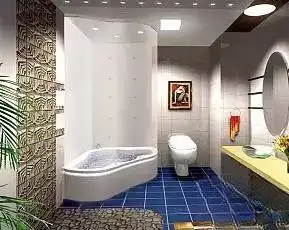
The bathroom is the second most dangerous area in home safety and is also the place in the home where moisture, mold and dirt are most likely to occur.
1Bathroom Color Feng Shui
Bathroom design also places great emphasis on color. Unlike living rooms, bathrooms rarely feature vibrant colors like red and purple. This isn't a choice on the part of the designer, but rather stems from feng shui considerations. Bright red and purple symbolize fire, while the element of the bathroom is water. Since fire and water cannot mix, bathroom color design avoids these incompatible colors.
White is a common color choice for bathrooms. White is clean and elegant, and white tiles are bright and smooth, broadening the field of vision and making small bathrooms feel less cramped. Elegant colors like light blue are also frequently used in bathroom designs, creating a visually pleasing effect. Pale yellow, gray, and black can also be seen in interiors. According to feng shui, bathrooms belong to the element of water, and the elements that complement water are metal and wood. As the saying goes, metal gives birth to water, and water gives birth to wood. White and light yellow represent metal, while black and gray represent water. Green represents wood. These colors complement the bathroom and can bring good luck and ward off bad luck.
2 Feng Shui Taboos in the Bathroom
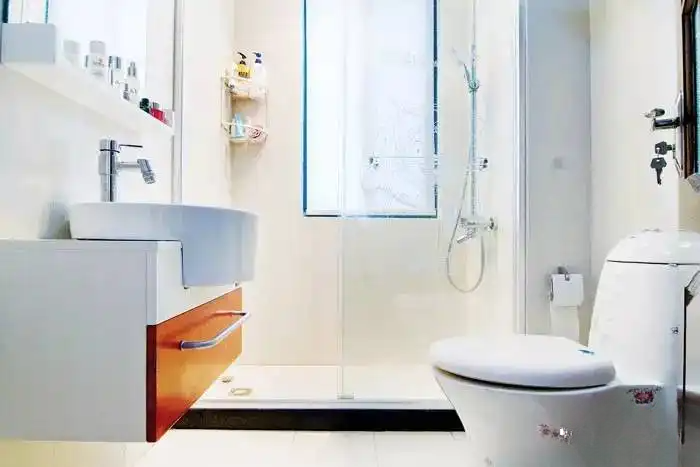
There are many taboos in bathroom design, mainly the following points
1. A bathroom cannot be windowless. As the bathroom is associated with water, it can be quite humid. This can cause foul air to accumulate. Normally, this air can be released through windows. However, without windows, this air will accumulate, which is detrimental to human health. It also negatively impacts the overall atmosphere according to feng shui.
2. Avoid excessive lighting in the bathroom. It's best to use soft incandescent lamps. Since lamps are electrical devices, their connectors should be kept clear, as this can easily lead to safety hazards in a humid environment like a bathroom.
3. The bathroom door should not face the main door. The main door is the air intake for the home, allowing the air entering through the door to flow throughout the room. If the bathroom door faces the main door, it will create a conflict and affect the feng shui pattern.
3. Things to note when placing bathroom appliances
Correct placement of bathroom fixtures
1. The bathroom is separated into dry and wet areas
Install a sliding shower door or hang a shower curtain in the shower area to separate the washbasin, toilet, and bathing area into dry and wet areas. This will keep your family healthy and improve your family fortune!
2. Open the window in the bathroom
It is best to have a window in the bathroom and keep it open at all times, which will add to the health of the family in terms of feng shui.
3. Tiles and bathtubs have anti-slip properties
The material of the tiles used in the bathroom must be anti-slip, especially when exposed to shower gel and soapy water.
4. Keep the bathroom and toilet doors closed at all times
The toilet door must be closed at all times, otherwise moisture and dirt will be allowed into the whole house, and of course the luck of the whole family will get worse and worse.
5. Keep the toilet covered when not in use
Feng shui masters always recommend that you keep the toilet lid closed when not in use to prevent negative energy from sucking away the positive energy in the home.
6. Place Yang energy objects in the bathroom
Feng shui masters recommend placing some objects that can increase yang energy in the bathroom, such as candles, thick bath towels, small rugs, etc., to balance the yin and yang energy in the bathroom.
Wrong placement of bathroom fixtures
1. The washbasin is located outside the bathroom door
If the wash basin is outside the bathroom, it will cause excessive humidity in the house and kidney dysfunction in the family. If it is located in the center palace, it will also cause financial loss.
2. The washbasin has a strange shape
The shape of the washbasin should not be too strange. Weird objects can easily attract evil spirits according to feng shui, so it is best to avoid them.
3. The bathroom is equipped with a gas water heater
Gas water heaters must never be installed indoors to avoid the dangerous production of carbon monoxide.
4. The color of bathroom tiles is too dark
Using dark colors in the bathroom can cause great inconvenience and danger to the elderly who are vulnerable and have reduced vision. It is best to use light and bright colors in the bathroom.
5. Water leakage from the bathtub or toilet
The bathtub is where the most water is, so the construction quality must be paid attention to. The edge of the bathtub must be sealed with professional waterproofing materials, and don't be too picky.
6. The toilet is in the same direction as the door
The toilet cannot be in the same direction as the front door, otherwise people in the house are prone to skin diseases, especially boils.
7. Triangular bathtub
It is best for the bathtub to be long or round. Regular pentagonal or hexagonal shapes are also acceptable, but triangular or irregular shapes should be avoided.
8. Too many mirrors
The mirrors in the bathroom should not be too many or too large. Just enough for the family's daily use.
4. Kitchen Feng Shui 1. Kitchen location selection
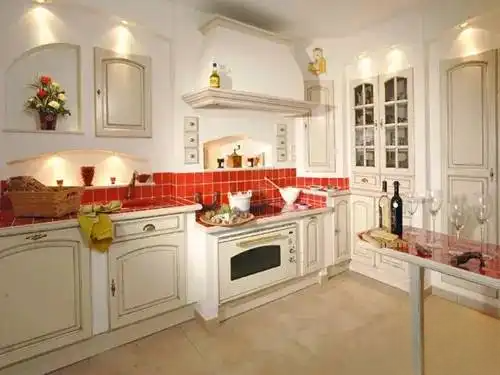
Basic principles of kitchen feng shui decoration
The kitchen is where we produce and replenish the nutrients we need. Enhancing the cook's joy and creating hygienic, delicious, and visually appealing meals is crucial to the health of the entire family.
When decorating your kitchen, it's best to use transparent or translucent doors and ensure adequate lighting. The kitchen, where both fire and water are located, is the most vulnerable area in the home for safety accidents, so bright lighting is paramount. Transparent doors allow the cook to interact with the family in the living room and ensure children's safety.
Maintaining a kitchen ceiling height of 220-240 cm allows the range hood to function properly and prevents the room from being filled with fumes. The countertop height should ideally be determined based on the user's height. Ergonomics should be used to minimize bending or overhanging. Ideally, the gas stove, sink, and refrigerator should be within three steps of each other.
Kitchen location selection
East: It is auspicious to have the kitchen located in the east. The east represents wood, and wood produces fire, making it a more suitable place to set up a kitchen.
Southeast: It is auspicious to have the kitchen in the southeast. Southeast is also auspicious.
South: It is unlucky to have the kitchen located in the south.
Southwest: It is also unlucky if the kitchen is located in the southwest.
West: It is neither good nor bad for the kitchen to be located in the west.
Northwest: It is auspicious to have the kitchen in the northwest Xu or Hai direction. On the contrary, the northwest Qian direction will blow northwest wind, bringing the kitchen heat into the room.
2What are the kitchen feng shui taboos
The kitchen is where we need to cook every day. It is not only closely related to our own health, but the feng shui issues it has and the impact it has on our health are equally important. In life, we must understand some feng shui taboos in the kitchen in order to better create a good feng shui environment.
1. The kitchen floor should not be higher than the living room or other living rooms. This prevents backflow of sewage. Due to the distinction between primary and secondary, the kitchen should not be above the living room or other living rooms. When serving food from the kitchen into the living room, the steps should be upwards; otherwise, there is a risk of losing wealth.
2. The most ideal layout for all kitchen items is to have them higher on the left and lower on the right, and lower in the front and higher in the back. Kitchen utensils, range hoods, disinfection cabinets, and other items should be placed on the left and back of the kitchen. This stems from the Feng Shui principle that the left side represents the Azure Dragon, which brings wealth to the owner, while the back represents the Black Tortoise, which supports the owner's health. Placing kitchen items in these two locations can bring health and wealth to the owner.
3. The kitchen door cannot face the toilet door: The stove is the source of food for the whole family and must absorb auspicious energy. The bathroom has always been considered a place with heavy evil energy. If the kitchen door faces the toilet door, it will not only have a serious impact on the health of the owner of the house, but also the evil energy in the bathroom will rush directly to the kitchen, which will affect the health and fortune of the owner of the house.
4. In traditional Feng Shui concepts, the kitchen is considered to be the place where the family cooks and maintains life, so it should not be too exposed, especially not suitable to be directly hit by external air brought in by doors.
3 Things to note about kitchen decoration Feng Shui
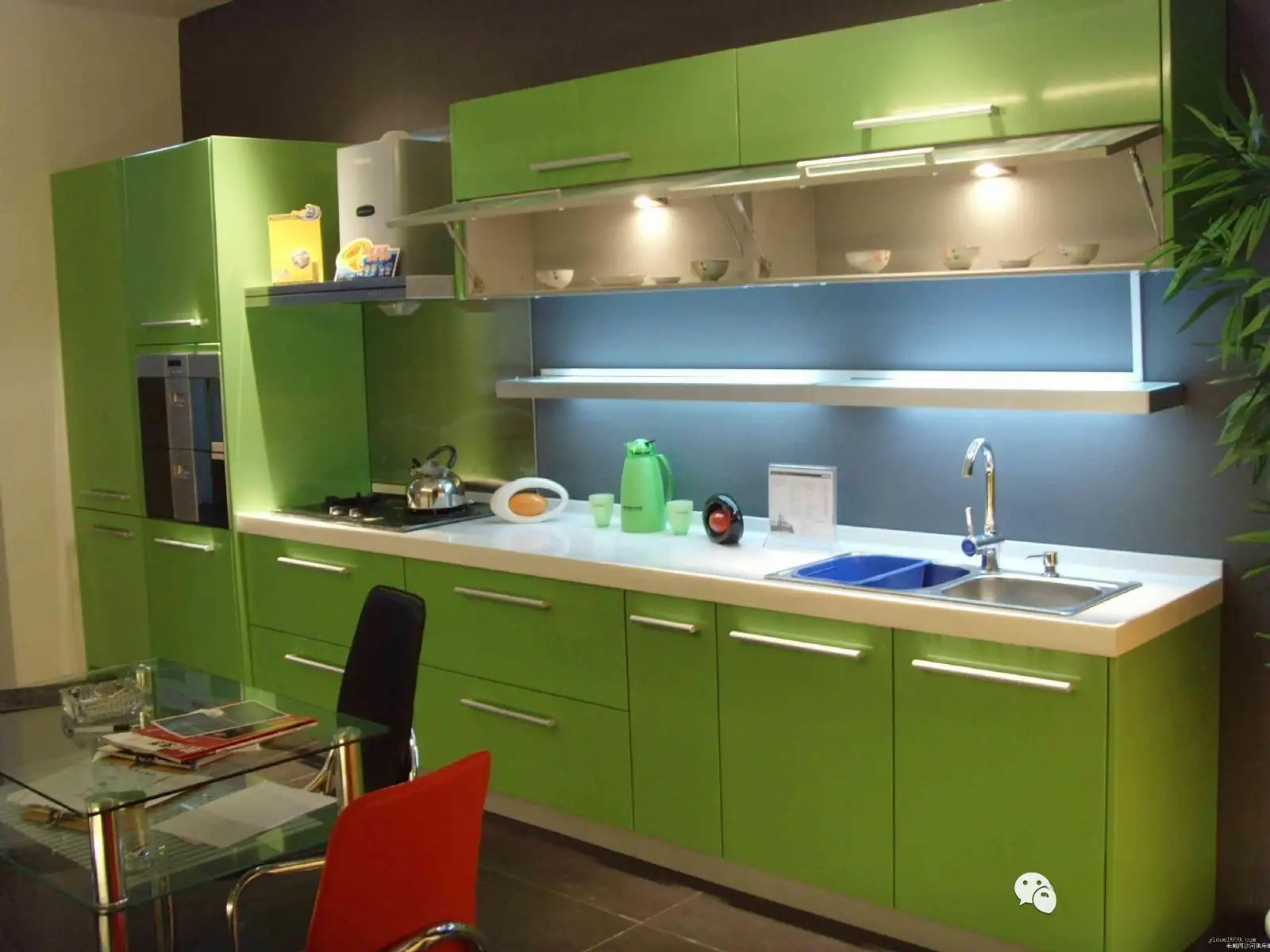
Feng Shui is a very important subject in decoration. Nowadays, many people have applied it to their home decoration, hoping to have a good Feng Shui in their home and improve the fortune of themselves and their family. There are certain requirements for Feng Shui in kitchen decoration.
While the kitchen can be dangerous, it can ward off evil spirits and negative energy. Therefore, it's best to place it in an unimportant area or away from the living room. Alternatively, it can be placed in an unlucky location, which will benefit the family and improve financial luck. Regarding the placement of kitchenware, it's best to follow kitchen feng shui principles. This not only eliminates negative influences but also creates favorable kitchen feng shui.
In order to save space, some families use the same door for the kitchen and toilet, which causes excessive water and fire in the home and is very unlucky. What's worse, if one goes to the toilet first and then to the kitchen, their appetite will be completely gone.
The kitchen should not be designed to be open, because the kitchen is a place where a lot of oil smoke gathers. If the kitchen is open, this bad airflow will rush into the room, which will have a bad impact on the owner's fortune in all aspects.
The stove in the kitchen should not face the refrigerator or sink: the refrigerator also represents a place for storage and wealth accumulation. Its nature is water and it is most afraid of fire attacks, which can easily cause health problems for family members.
It is best to use fresh, bright and warm colors in the kitchen to give people a relaxed feeling, but it is different for the floor. It is best to use darker colors to give people a stable feeling. The whole kitchen has a light top and heavy bottom feeling, which makes people feel down-to-earth.
5. Feng Shui of the Entryway
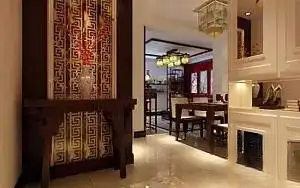
The entrance hall is also called the fighting room, the hall, or the entrance hall.
1How to design the Feng Shui of the entrance
The entrance hall is often used to adjust the home environment. Common entrance hall features include mirrors, shoe cabinets, and rain gear storage partitions. It can be said that having an entrance hall makes our lives more convenient. However, the existence of the entrance hall's feng shui cannot be ignored.
How to design the feng shui of the entrance hall
1. Feng Shui of paintings hanging in the entrance hall: The entrance hall is the first place you see when you enter the house, so the decoration of the entrance hall is very important in home Feng Shui. What is suitable to be placed in the entrance hall, and what should be paid attention to in the Feng Shui of paintings hanging in the entrance hall? You can choose a traditional Chinese painting with Feng Shui significance in the entrance hall, such as a painting of nine fishes, a painting of pomegranates smiling to welcome the world, a landscape painting with Feng Shui significance, etc.
2. Feng Shui of Wall Partitions: Wall partitions should be solid at the bottom and hollow at the top. The lower half of the entrance facing the main door should be decorated with high-quality brick or wood panels as a template, while the upper half can be decorated with bright decorative materials such as frosted glass. Note that the door handle opposite the entrance can be installed with a mirror, but frosted glass, unlike a mirror, does not reflect light.
3. Flooring Feng Shui: Upon entering the entrance hall, the first thing you see is the floor. When designing it, pay attention to its smoothness and color. Bright tones and auspicious patterns are preferred, but avoid diamond-shaped or angular patterns. If the entrance hall floor is made of wood, the pattern should flow into the interior, not directly toward the front door. The flooring should not be too smooth, as this can cause family members to fall.
2 Feng Shui of Paintings Hanging in the Entryway
1. Freehand landscape painting for the entrance: Landscape painting reflects the beauty of nature. The beauty of natural landscapes exists objectively, endowed by nature. When people appreciate landscape paintings, they often combine their imagination and associations with life. The majestic and ever-changing Huangshan Mountain and the unique and beautiful Guilin landscape offer unique aesthetic experiences.
2. The peony painting for the entrance hall represents wealth and good fortune. Peony is elegant and noble, with large and beautiful flowers, which symbolizes wealth and good fortune. It is the most common subject matter in home decoration.
3. Auspicious Plum Blossom Painting for the Entryway. The plum blossom has five petals, representing the five auspicious deities: longevity, prosperity, happiness, virtue, and health. The plum blossom, endowed with "the highest natural beauty, blooms alone despite the cold of winter," is one of the Four Gentlemen of Flowers and a symbol of the highest ideals of scholarly character. Hanging a plum blossom painting in the entryway of your home is auspicious and beautiful.
3. The location of the entrance in the house
The entrance hall is the heart of a home, the first impression it makes on visitors. From the front door into the living room, the entrance hall serves as a buffer zone, allowing visitors to calm their minds for a short period of time. It is the only way to enter the house, so the entrance hall's location is very important.
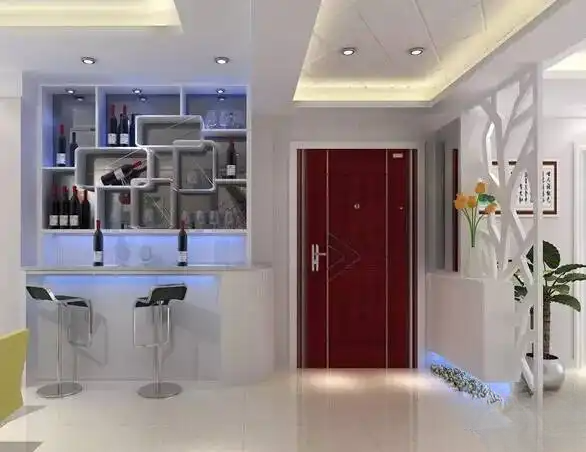
Entrance direction
It's auspicious to have the entrance porch located to the left or right of the main entrance. However, avoid having the entrance porch aligned with the main entrance, as this can easily allow outsiders to see everything inside, compromising the confidentiality of the home. Therefore, the entrance porch should be located to the left or right of the main entrance.
Entryway material
It's best to use opaque materials for the entrance, as Feng Shui emphasizes "hiding wind and absorbing energy." Allowing the wind to swirl can also dispel negative energy. The size and height of the entrance should be commensurate with the size and width of the door to maximize its effectiveness.
6. Restaurant Feng Shui
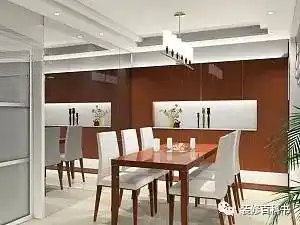
The ancients emphasized that "food is the most important thing for the people," and what happens in the dining room is the most important thing in life. The dining room is one of the most common public spaces for the whole family to gather, so naturally, residents need to pay more attention to the layout and furnishings of the dining room.
1. Location selection of restaurant feng shui
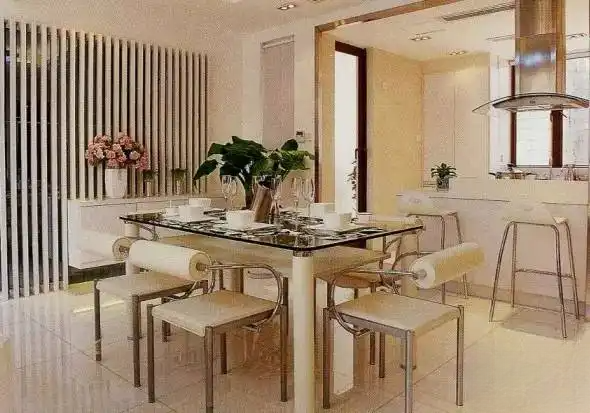
Restaurant Feng Shui layout
Larger homes typically have separate living and dining areas, while smaller units, due to space constraints, may only have a dining room. Regardless of whether the dining room can be its own corner, there aren't many feng shui considerations for it; just a few things should be kept in mind.
Be careful when placing your restaurant
1. The restaurant should not face the main door
The meaning of the restaurant facing the door is that you can see the dining table as soon as you open the door. If the two are far apart, there is no big problem, but if the two are only a few steps apart, the situation is not ideal, because the door used for entry and exit will drive the air flow towards the dining table, resulting in poor gastrointestinal health of the family.
2. It is not advisable to flush the toilet in the restaurant
Toilets are filled with foul air. Eating facing the toilet is not only psychologically uncomfortable, but also, according to feng shui, it can easily cause family members to be contaminated by foul air, leading to poor health. If the dining table faces the toilet door and then the toilet, the problem will be even more serious.
3. Choose a location close to the kitchen and far from the door
In most modern homes, the dining room is located quite close to the kitchen. Feng shui experts also agree that this layout saves time when serving food, making it both convenient and efficient.
4. The restaurant is far away from the studio
If the living room also serves as a studio or has a desk, it is best to keep the dining space away from it, as the energy in an office is usually oppressive and ambitious, which is not suitable for a relaxing meal time.
5. The dining table should not face the altar cabinet
The shrine cabinet is a place for worshipping the gods and should not be too close to where mortals eat. Because the shrine cabinet must pass through the different paths of yin and yang, the immortals and mortals are separated. Therefore, the dining table should not face the shrine cabinet directly; it must be kept at a distance.
6. There should be no beams above the dining table
The roof above the dining table should be flat and intact. If there is a beam pressing on it, or it is located downstairs, or the roof is tilted, it will be harmful to health.
2 dining table options
1. The shape of the dining table
1. Full moon-shaped dining table
Traditional dining tables are full-moon shaped. The round shape symbolizes perfection, a close family reunion, and intimacy. Round tables also help gather people, creating a vibrant dining atmosphere and fostering a sense of community.
2. Oval dining table
Using an oval dining table can cause family members to form factions or divisions, which may lead to conflicting forces. Large families should avoid using it as much as possible.
3. Square dining table
The square dining table is relatively small and usually seats only 4 people. It is called a four-immortal table, and the one that seats 8 people is called an eight-immortal table.
4. Rectangular dining table
A rectangular dining table can easily create a distinction between host and guest, which emphasizes the position of the head of the household. This is not conducive to emotional exchange and communication among family members, and it is easy to give instructions or orders.
2. The color of the dining table
Generally, choose a neutral color for your dining table, such as natural wood, brown, black, or other calming colors. Avoid overly bright or glaring colors. To change the color and style of your table, choose a different tablecloth.
In addition, the color of the dining table can be determined according to the owner's preferences and the five elements.
* Five Elements: Metal: White, Silver, Gray. Prosperous Colors: Brown, Yellow.
* Five Elements: Wood: Green, Cyan, Gray. Prosperous Colors: Black, Gray.
* Five Elements belonging to Water: Black, Gray; Gray. Prosperity Colors: White, Silver.
* Five Elements belonging to Fire: Red, Purple, Gray. Prosperity Colors: Green, Cyan.
* Five Elements belonging to Earth: Brown, Yellow, Gray. Prosperous Colors: Red, Purple.
3. The size of the dining table
The size of the dining table should be moderate, and should not be too large or too small. It must be in a reasonable proportion to the size of the restaurant. If the dining table is too large or too small, it will hinder the feng shui of the restaurant.
3 Things to note about restaurant layout
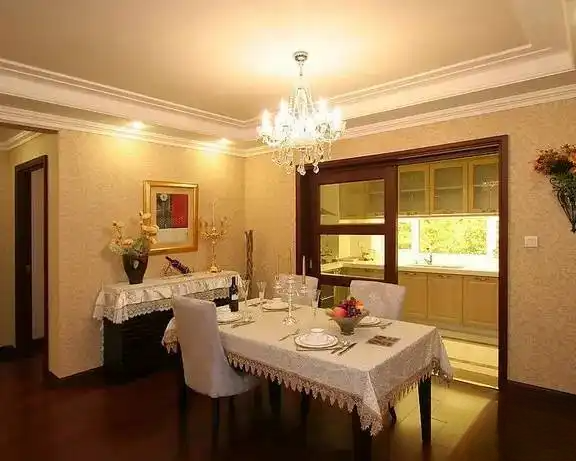
Restaurant Layout Misconceptions
1. The dining table is placed next to the gas stove
It's a Feng Shui taboo to place your dining table near a gas stove. It's best to place it away from the stove. Alternatively, placing a screen between the two is fine.
2. The color of the dining table is very dark
It is best to keep the dining table bright and clean. If the table mat you are using is dark, replace it with a bright color to change the atmosphere.
3. There are clutters on the table
It's best to keep the dining table clean and organized. If you have any items, you can also place flowers or plants for decoration. Too much clutter will ruin the feng shui of the dining table and the restaurant, disrupting family harmony and affecting the relationship between husband and wife.
Correct restaurant layout
1. Pattern
From the perspective of feng shui, the layout of the restaurant, like other rooms, should be square, and should avoid any missing corners or bumps. Rectangular and square layouts are best.
2. Decoration
The dining room is where the family eats and consumes energy, representing the family's wealth. Therefore, the dining room should feature bright colors and bright lighting to increase the energy of the Fire Element and store Yang. Placing plants on the dining table can enhance wealth.
3. Harmony of Yin and Yang
The layout of the restaurant should be in accordance with the theory of yin and yang balance. Too much yang will cause family discord; too much yin will also harm the family fortune.
4. Lucky Numbers
From the perspective of Feng Shui, 6, 8, and 9 are all lucky yang numbers, so the number of seats at the dining table should preferably match these numbers.
5. Auspicious direction
Each family member should sit facing one of the four auspicious directions of their natal Gua during meals. The mother's shadow should face the Yannian direction, while children should face the Fuwei direction, which is conducive to learning. Elders should sit facing the Tianyi direction for health and longevity. Those responsible for the livelihood should sit facing the Shengqi direction.
6. Mirror
Installing a mirror in the dining area to reflect the food on the table has the effect of doubling your wealth.
7. Balcony Feng Shui

The balcony is the outer corridor of the building space and an extension of the indoor space. From ancient times to the present, the feng shui of the balcony is crucial to the whole house.
1 Balcony Feng Shui Taboos
Balcony feng shui is an important component of overall home feng shui. Scientific design can significantly impact a home's overall fortune, so its importance cannot be underestimated. Balcony feng shui design can be done without increasing your fortune, but be sure not to disrupt the existing feng shui. The following are some taboos regarding balcony feng shui.

1. The balcony should not face the sky-cutting evil, that is, the small passage between two high-rise buildings. In Feng Shui, this often means bloody disasters and is a sign of great misfortune.
2. The balcony should not face the street directly. While most houses have balconies that are parallel to the street, a design that faces it perpendicularly and directly is called a "direct facing" (直冲) and is considered highly inauspicious in feng shui. This is because cars on the road constantly generate interference waves that impact the homeowner, affecting their health and magnetic field, which can negatively impact their financial fortunes and lead to financial loss.
3. Avoid having your balcony face a building that's too imposing. This generally refers to large corporate buildings like offices and banks. Buildings that are more imposing than your own home will suppress your family's financial luck and feng shui, preventing you from accumulating wealth.
4. Avoid facing buildings with excessive Yin energy. This typically refers to hospitals, temples, funeral homes, and other structures associated with the sick, the dead, or Buddhism. This also includes areas with poor feng shui, such as jungles and hills. Excessive Yin energy can damage the fortune of the entire family and significantly impact wealth and destiny.
5. The balcony cannot face a jagged building. The jagged shape means that there will be many sharp corners on its outer wall. In Feng Shui, there is a saying that "sharp corners are unlucky", which will cause diseases to attack the home and misfortune. A convex mirror must be used to break it.
2 Balcony Feng Shui Layout
The pros and cons of balcony feng shui can be changed through scientific layout and arrangement. A well-planned balcony can give the subject a sense of ease and comfort, and can create a sense of harmony between people and nature.
Balcony feng shui layout design primarily focuses on facing east or south. The saying "purple air comes from the east" refers to auspicious energy, a symbol of good fortune. An east-facing balcony can receive this auspicious energy, allowing it to flow into the home and bring health to the family. While this is merely a feng shui concept, in practice, an east-facing balcony allows direct sunlight to penetrate the room early in the morning, creating a warmer and more refreshing atmosphere. The concept of facing south stems from the saying "fragrant breeze comes from the south," which is also considered auspicious in feng shui, bringing comfort and intoxication.
3. Choice of balcony orientation
Basic principles of balcony feng shui decoration
In spatial science, the balcony has the dual functions of buffering and safety; in feng shui, it is related to the future and official career of the residents; the front balcony is responsible for official career, and the back balcony is responsible for financial fortune.
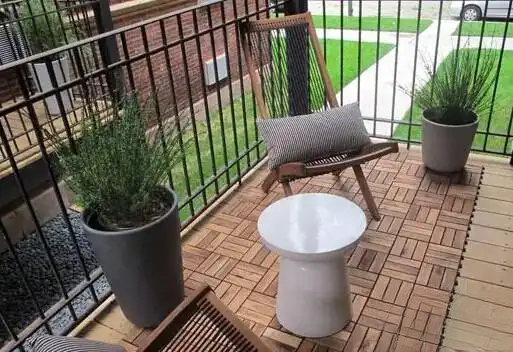
When choosing housing, civil servants should consider options with front balconies. Without a front balcony, promotion opportunities are significantly lower. Even if they are more capable and dedicated than their colleagues, they often miss out on promotions. Even if they do have the opportunity, they often face numerous obstacles.
Any house should ideally have a back balcony; otherwise, it would be a significant loss of living function. Clothes hung out on the back balcony should be removed as soon as they are dry; they should not be left hanging for two or three days until they are ready to wear. Both front and back balconies should be clean and bright, absolutely free of dirt and debris.
Balcony orientation selection
1. The balcony should face due east or due south. Some balconies make people feel comfortable because of their good location, wide view, good lighting and ventilation.
2. The balcony faces south, which is also very good in terms of feng shui.
3. The balcony faces north, and the cold wind enters the room in winter, affecting people's mood. If the warming measures are not done well, it is easy for family members to suffer from colds or respiratory diseases.
4. It is even more inappropriate to have a balcony facing west. As the sun sets, the balcony is exposed to the slanting sunlight every day, filling the home with heat and affecting the health of the family.
Balcony location selection
1. The balcony should not face the street directly. If the balcony faces the street directly, it is like a tiger pouncing head-on, disrupting the magnetic field of the home and being detrimental to the health of the residents.
2. The balcony should not face sharp corners. If there are sharp corners in front of the balcony, such as the sharp corners of nearby buildings, these sharp corners will be detrimental to the fortune of the house.
3. The balcony should not face a jagged building.
4. The balcony should not face the "bow road". The "bow road" refers to the corner of the street. If the balcony faces such a corner, it will be bad for the family fortune.
5. The balcony should not face the main door. If the balcony faces the main door, you can draw the curtains for a long time to block it.
6. The balcony should not face the kitchen. The curtains of the balcony door should be drawn as much as possible, or a door should be installed on the traffic line between the balcony and the kitchen.
8. Feng Shui for Children’s Rooms
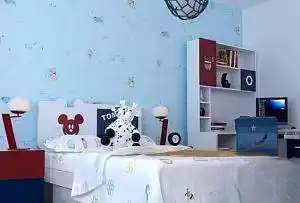
Every parent wants to give their child the best, so they set up a separate children's room for their child and all the children's furniture is the best.
1 Analysis of the orientation of children's room
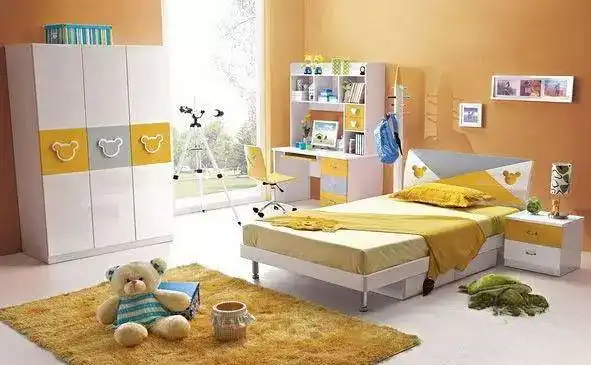
Children are the sun at seven or eight o'clock in the morning and the flowers of the future. If you want your children to grow up healthily, the orientation of the children's room is very important. The following locations are suitable for children's rooms:
1. Children's rooms are preferably located in the east or southeast of the house. These two directions can receive sunlight in the morning, which is beneficial to the healthy development of children. It indicates that children will be positive, lively, cute, and grow steadily.
2. A children's room can also be set up in the western part of the house. The west belongs to the element of gold and can receive sunlight in the afternoon, which is conducive to children's sleep.
3. Treat boys and girls differently. When choosing a bedroom orientation for a child, remember that the east represents the Zhen hexagram, representing the eldest son, while the southeast represents the Xun hexagram, representing the eldest daughter. Therefore, choose a different bedroom orientation based on the child's gender.
4. When designing a child's room, consider the child's birth date and five elements. Calculate the child's five elements based on their birth date and time. If the child's five elements are deficient in metal, locating the room in the west or south can help compensate. If the child's five elements are deficient in wood, locating the room in the east or southeast is better. If the child's five elements are deficient in water, locating the room in the north is recommended. If the child's five elements are deficient in fire, locating the room in the south is recommended. If the child's five elements are deficient in earth, locating the room in the southwest or northeast is a good choice.
2 Feng Shui of Children's Bed Placement
In addition to the orientation of the children's bed, it is also necessary to pay attention to the position of the children's bed and other spaces in the home, which will affect the feng shui of the children's room.
Things to pay attention to when placing the bed in the children's room:
1. Do not place children's beds under beams. The beams will put pressure on the children, making them prone to nightmares.
2. The bed should not face a window with too strong sunlight, because too strong sunlight can easily make people feel upset.
3. The bed should not be placed on the balcony, nor should it be close to the floor-to-ceiling windows on the balcony, let alone the floor-to-ceiling windows on the balcony.
4. Do not place the head of the bed close to the toilet.
5. If there are two or more children living in one room, avoid placing their beds in different directions, as this will easily create barriers between them.
6. The bed should not be placed above or below the kitchen stove (which may cause skin diseases and irritability), nor above or below the toilet.
7. The bed should not be placed directly under the altar in the shrine hall (it is best not to do this if the child is healthy).
8. Do not place a tape recorder next to the bed (it can easily cause neurasthenia).
3 Feng Shui Taboos for Children's Rooms
As modern people's expectations for home decor rise, parents are also paying attention to the feng shui of children's rooms. Parents are concerned about the location of the Wenchang position and which directions are beneficial for their children. Taboos for children's rooms cover many aspects, from layout to color, from decoration materials to furnishings.
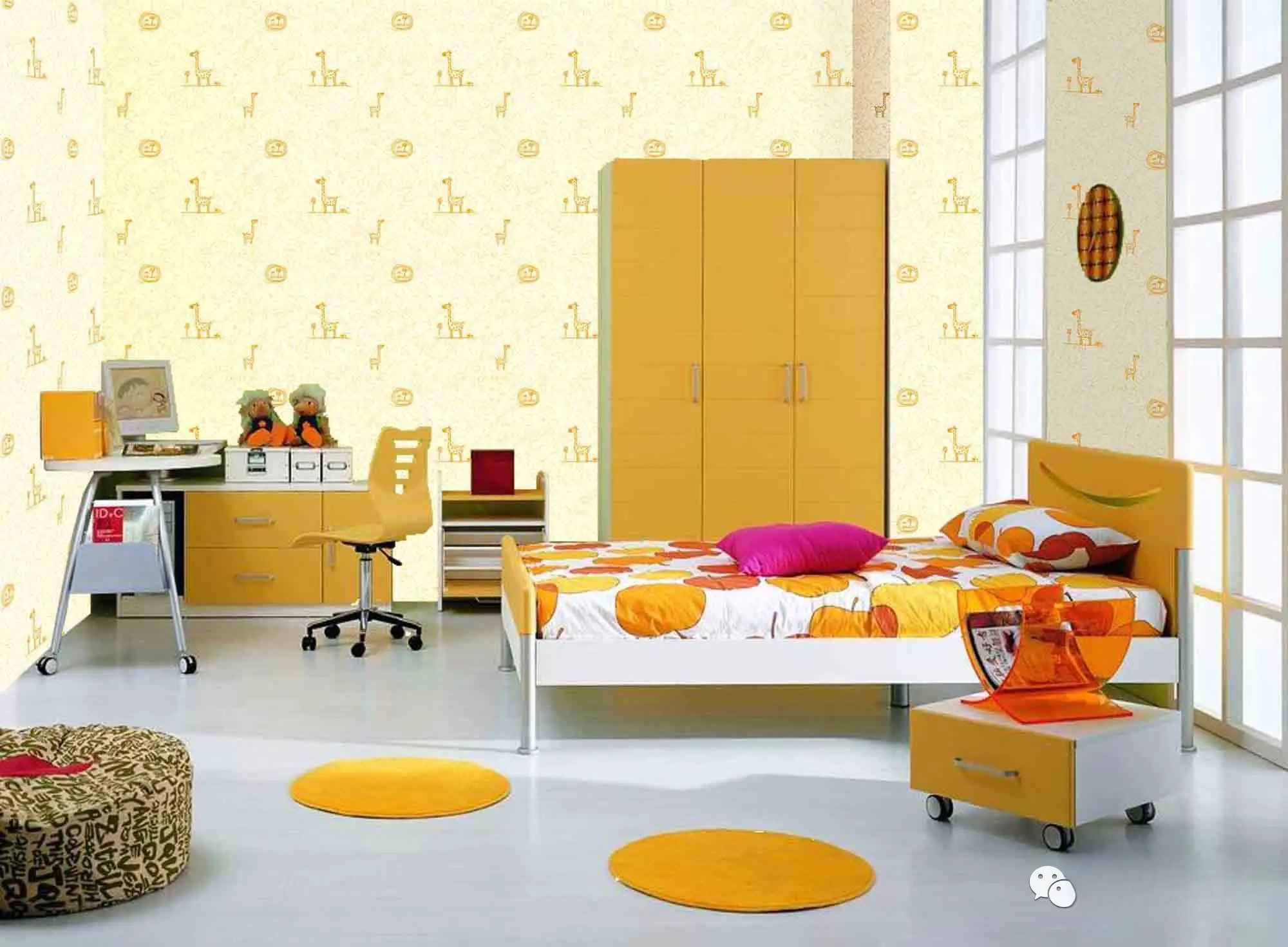
Taboos for children's room layout
1. The children's room should not be opposite to the toilet door.
2. Children's rooms should not be located next to the machine room or under the balcony. Placing them next to the machine room may easily cause neurasthenia.
Color taboos for children's rooms
1. Do not lay dark red floors or carpets on the floor of the children's room. Red can easily make people irritable, so try to avoid it.
2. Avoid using bright red or black for bedroom curtains. Dark colors are not conducive to the colorful light in the room. Children are in the developmental stage, and getting more sun exposure is beneficial to their body's immunity.
3. It is best to use milky white for the ceiling and avoid using dark colors.
Taboos for children's room decoration
1. Avoid placing scary decorations such as ferocious eagles and tigers, ghost masks, etc. in children's rooms, as these will affect children's subjective impressions of things.
2. Avoid placing weapons such as Japanese swords, wooden swords and forks, so as to prevent children from developing a belligerent mindset from an early age.
3. The pictures on the wall should mainly focus on positive content. Do not hang pictures of celebrities with heavy makeup or statues of gods, as this will easily influence children's daily life and be detrimental to their growth.
4. Never lock children’s toys in a cabinet to prevent them from developing negative physical and mental tendencies from an early age.
5. Do not hang various strange decorations on the ceiling of children’s bedrooms.
6. It is not advisable to place high objects on the desk, such as bookshelves, as this will increase the academic pressure on children and cause them to dislike studying.
Taboos on decoration materials for children's rooms
1. Avoid choosing decoration materials that are harmful to the body, such as those containing harmful substances such as formaldehyde, TVOC, benzene, etc., which can cause damage to the health of military children.
2. Avoid choosing radioactive natural stone or plastic flooring for the floor. You can choose solid wood flooring.
3. Try not to use iron furniture, because iron products give people a cold feeling and can easily hurt children. It is better to choose solid wood furniture.
9. Feng Shui of the Study Room
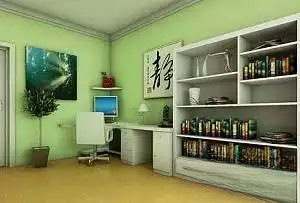
The feng shui of a study room plays a crucial role in a family's learning, intelligence, and work. Many people like to place feng shui ornaments in their study room to enhance their fortunes. However, be careful not to place them randomly, as this can affect the overall feng shui.
1What are the Feng Shui taboos in the study room?
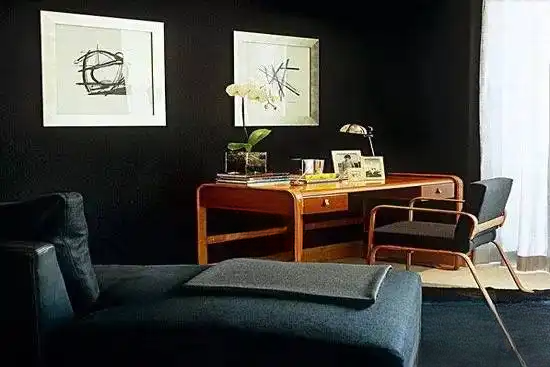
In Feng Shui, the most important thing for a study is good ventilation and lighting. People spend long hours reading, so keeping their minds clear and the air fresh is crucial. Therefore, choose a well-ventilated room for your study, and keep doors and windows open regularly to ventilate and protect your books.
If there is space in the house to make a study, that would be the best. If there is no study, and the living room is large enough, we should also open up a separate space as a study, and reasonably separate it from other spaces so that they do not affect each other. When arranging an independent study, it must fully reflect the owner's personality and connotation.
According to common thinking, a desk should be placed in a well-lit and fresh airy place. However, from the perspective of Feng Shui, a desk should actually be placed in a corner of the room, so that there is a wider space in front of the desk, which can help people open up their minds.
A study should not be located within the master bedroom to avoid offending the fetal spirit. Placing a study within the master bedroom creates a misalignment between reading, resting, and sleeping, blurring the lines between these functions and hindering the study's effectiveness. Furthermore, late-night reading and work can disrupt others' sleep.
2What kind of calligraphy and painting is good for the study room Feng Shui
The study is a relatively quiet place, and the paintings hung in the home are usually few but exquisite, with the intention of adding the finishing touch. On the contrary, too many and too complicated, too dazzling, will appear tacky. The study is more suitable for hanging some landscapes and auspicious calligraphy and paintings with beautiful meanings. People have had a strong interest in mountains and rivers since ancient times, so some landscape paintings are particularly suitable.
When it comes to the colors of paintings in the study, it is best to use simple, bright, and relatively elegant colors to highlight the atmosphere of the study. If you hang some colorless paintings, it will look particularly tacky. Therefore, it is best to use traditional calligraphy and paintings, and especially avoid hanging paintings such as celebrity posters.
The plum blossom has a spirit that is not afraid of the severe cold and is indomitable. In ancient times, literati and scholars often used plum blossoms to describe those who are not afraid of difficulties and have strong wills. This spirit has always been regarded by people as a symbol of noble character and noble temperament. Therefore, it is meaningful to hang some such paintings in the study.
3 Taboos for placing desks in study rooms
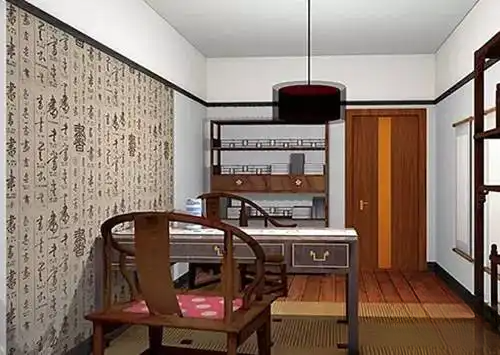
The feng shui of a study room plays a crucial role in a family's learning, intelligence, and work. Many people like to place feng shui ornaments in their study room to enhance their fortunes. However, be careful not to place them randomly, as this can affect the overall feng shui.
1. The desk should not face the door behind, to the left or right. The door is the air outlet, which takes in both fresh air and foul air. Sitting with your back to the door will make you feel insecure and feel a chill down your spine. You will often be in a state of tension, wary of unexpected attacks from behind, which is very unfavorable.
2. Avoid having a beam above your desk. A desk should also avoid having a beam above it. If this is unavoidable, install a ceiling to block the pressure. Of course, it's even more taboo to have a beam above the desk or above the head of the person sitting there. Otherwise, business operations will inevitably be difficult and will affect physical health and mental well-being. The desk should not face the toilet, nor should it be backed against the toilet or bathroom. It should not face the toilet or bathroom doors on either side.
3. The desk should not face the window. It is not appropriate to have the desk facing the window. People will be easily distracted by the scenery outside the window and find it difficult to concentrate on study and work.
4. It is best not to have high objects in front of the desk. It is not advisable to place high objects on the desk, such as bookshelves, as this will increase the pressure of study and work and cause boredom.
5. Do not place your desk above or below the kitchen stove, or above or below the bathroom. Do not place your desk facing the kitchen or bathroom. The bathroom has a foul, damp air, and if it faces directly into the bathroom, it will affect those who study. In feng shui, this is called "Chong Sha," which is bound to affect one's mood and impair one's health.
6. Do not place the desk next to the door. Placing the desk next to the door or too close to the door will distract people and make them feel uneasy, which will naturally reduce their efficiency.
7. The placement of items on the desk has its own rules. The left hand position of the Green Dragon should be high and active, while the right hand position of the White Tiger should be low and quiet.
10. Feng Shui of Home Decoration
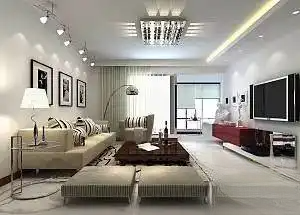
What secrets lie between home decoration and Feng Shui? Indoor Feng Shui is very important to a family. Therefore, you must pay attention to the Feng Shui of home decoration to create good Feng Shui and bring good fortune to your home.
1. Key points of interior decoration Feng Shui
Don’t think that interior decoration is a simple matter. In fact, there is a lot of Feng Shui knowledge involved. So what are the key points of Feng Shui in interior decoration? Let me tell you about it below.
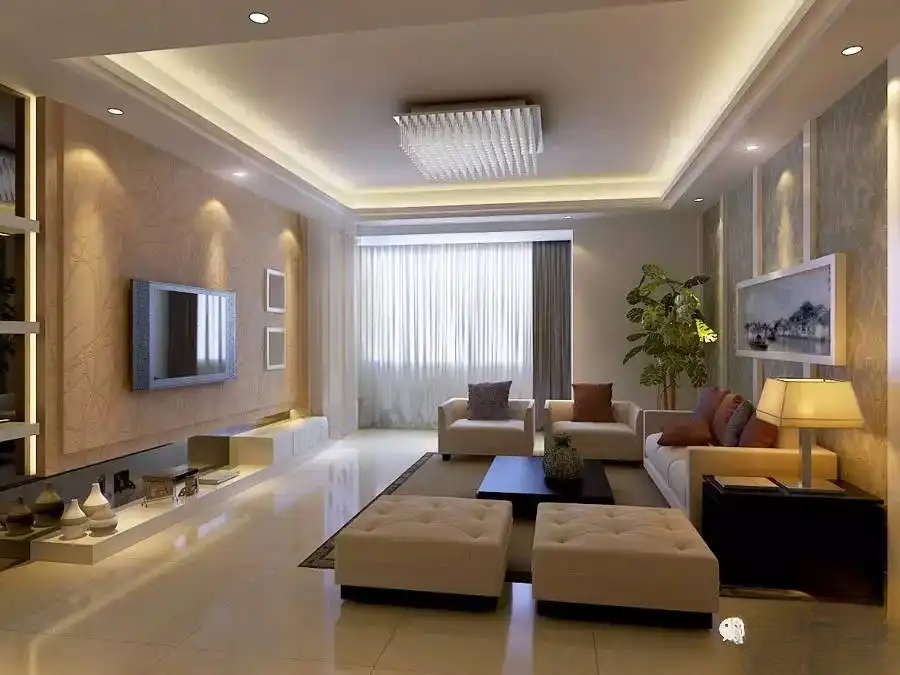
Bed and mirror
The bedroom is a place for rest. After a long day of work or study, fatigue can lead to blurred vision. In this case, if the bed faces a mirror, there's a high risk of misperceiving other objects reflected in it, potentially causing a startle. Furthermore, mirrors are a prominent feature in horror films and suspense novels, so sleeping facing them can be somewhat depressing.
Sofa and window
People, many plants, and pets tend to prefer windows because they let in bright light and fresh air, but sofas are different. Regardless of the material, if a sofa is placed near a window for a long time, the strong sunlight will cause the surface to fade, directly affecting its durability. This is especially important to avoid in west-facing rooms.
Large furniture and small rooms
The "grudge" between them is not that deep, it's just that large furniture lacks a sense of coordination in a small room. If a large, towering piece of furniture is forced into a small room, it will not only destroy the overall shape of the house, but also make the proportions of the house unbalanced and hinder the visual sense of freshness.
Bedroom door and kitchen door
If these two enemies start fighting, it's not good and could cause internal damage to you and your family. If the bedroom door faces the kitchen door, the hot and humid air from the kitchen will easily circulate into the bedroom, and the bedroom is often filled with moisture-absorbing fabrics, making the bedroom environment more humid.
2 Taboos of Feng Shui for Living Room Decorative Paintings
The design and furniture arrangement in the living room can better highlight the owner's temperament, connotation, personality and preferences, etc. There are also many taboos in the feng shui of living room decorative paintings.
The Feng Shui orientation of living room decorative paintings: Not every orientation in the living room can be used to place home decorative paintings. Proper Feng Shui arrangement of the living room can bring wealth and career help to the entire family.
Due South: A well-designed layout in this direction will bring good reputation to the family, especially to the head of the household. Red is the best choice for home decorations in this direction, such as flamingos and sunrises. Red carpets and wooden ornaments are also acceptable. Remember not to place mirrors in this direction, as mirrors represent water, and water extinguishes fire, which can negatively impact your reputation and fortune.
Due East: The sun rises in the east, and this direction represents good health. According to Feng Shui, this direction should be decorated with green. Landscape paintings, or even plant paintings, are preferred. This can promote family health and longevity. Due North: Due North represents family and career luck, so calming colors are recommended for decorating. Blue or black are auspicious colors for living room decorations. Because this direction is associated with water, landscape paintings can be used as decoration, as can metal ornaments (metal generates water).
Generally speaking, when choosing paintings for your living room, most families prioritize visual appeal and often overlook feng shui considerations. Each painting carries both good and bad luck. For example, if your home lacks water, a painting of flames would be highly inappropriate. Therefore, in living room feng shui, each painting is carefully considered. Consider whether any family members might have conflicting feng shui elements before deciding on the placement and type of painting.
11. Feng Shui of Furniture Placement 1. Feng Shui Knowledge of Living Room Furniture Placement
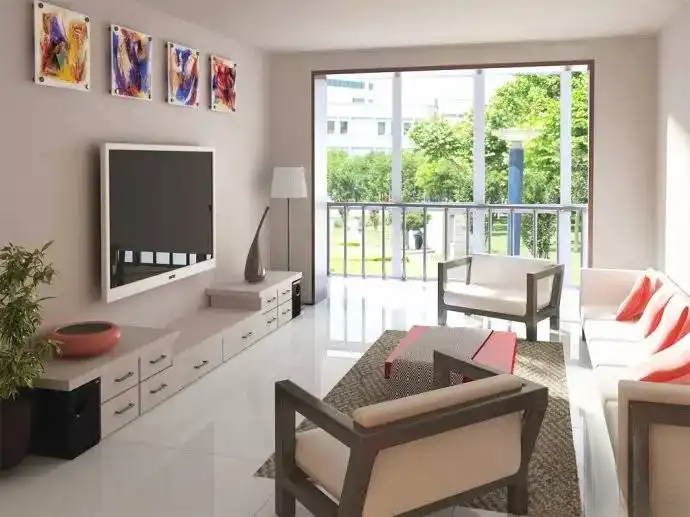
PART1: Location
The living room is a place shared by the family and should be located in the center of the house. If the living room is spacious and a part of it is separated to make a bedroom, it would be the most undesirable living room.
PART 2: Decoration
The number of sofa sets in the living room should not be repeated. Avoid using more than one and a half sets, or combining two sets: one square and one round. Fish tanks and bonsai in the living room help to draw in energy and bring vitality to the room. It's best to use an odd number of colorful fish species.
PART3: Wealth Position
The best location for the Wealth Zone is diagonally across from the entrance. Avoid pillars and recessed areas. If there are windows, cover them with curtains to prevent exposure. If this is a passageway, place a screen to prevent awkward penetration and create a favorable Wealth Zone. Placing a lush bonsai plant in the Wealth Zone can enhance your fortune; choose green plants with large, round leaves.
PART4: Movement
The living room's circulation should be open and unobstructed, with unobstructed views. Neither the room's door nor the back door should be visible from the entrance, as this creates the problem of "entering from the front and exiting from the back, preventing wealth from accumulating." Walkways should also avoid running vertically or horizontally through the entire room.
PART5: Beams and Columns
The living room should avoid obstructions caused by beams, and the structure can be decorated into various beautiful shapes, such as traditional arches, ceiling extensions, painted flowers, etc., or it can be divided into two areas.
PART6: Lighting
The living room of a Qian house must be bright, with a generous use of white, to enhance the inhabitants' intelligence and refinement. Dark hues covering more than half of the four walls can lead to dullness and are particularly detrimental to men. The living room of a Dui house should be appropriately bright, but not too bright. This means white should not cover more than three-quarters of the total area, or three sides should face large windows. Otherwise, the woman may dominate the household, creating a potential risk of harm to her husband or other men. The living room of a Gen house should not be too spacious, preferring a palette of white, khaki, or brown.
PART7: Space
The living room of a Li house should avoid excessive unused space, as this can easily lead to fire disasters and lawsuits. The living room of a Kan house should feature calm and sober colors, avoiding bright colors, as this can negatively impact financial well-being. The living room of a Kun house should feature numerous furnishings, heavy furniture, and a yellow or natural wood color scheme. A narrow layout is highly unacceptable. The living room of a Xun house should be shallow and spacious, with a generous use of green, preferably with floral and wood decorations. The living room of a Zhonggong house can be freely arranged, but a yellow color scheme should be used to unify the room.
PART8: Color
East-facing living rooms should use yellow as the primary color. East is associated with the Wood element, a place where Wood energy flourishes. According to the Five Elements theory, Wood overcomes Earth, representing wealth. This means that Earth represents Wood's wealth, and yellow is the color of Earth. Therefore, if your living room faces east, choose paint, wallpaper, and sofas in shades of yellow. This color can be used to attract wealth. South-facing living rooms should use white as the primary color.
The above are 8 suggestions and adjustments on the Feng Shui of living room furniture placement. You can make relevant optimizations and adjustments according to the situation of your own family living room. It does not have to be done in one step, but at least you can make some progress in optimization and adjustment. At the same time, you can also make some reconfigurations according to the above introduction. Not only can you adjust the Feng Shui of the living room furniture placement, but you can also give your home a new style. Why not?
2 Feng Shui knowledge about bedroom furniture placement
Traditional culture believes that the layout of the bedroom is the best indicator of family harmony, and the wardrobe in the bedroom should not be ignored.
Clothing is essential in people's lives, and wardrobes are the primary piece of furniture used to store clothing and accessories. Naturally, they're also a crucial element in bedroom design. I've always thought buying a home was a matter of feng shui, but I never imagined wardrobe placement also has its own feng shui considerations, and the knowledge behind them is quite profound.
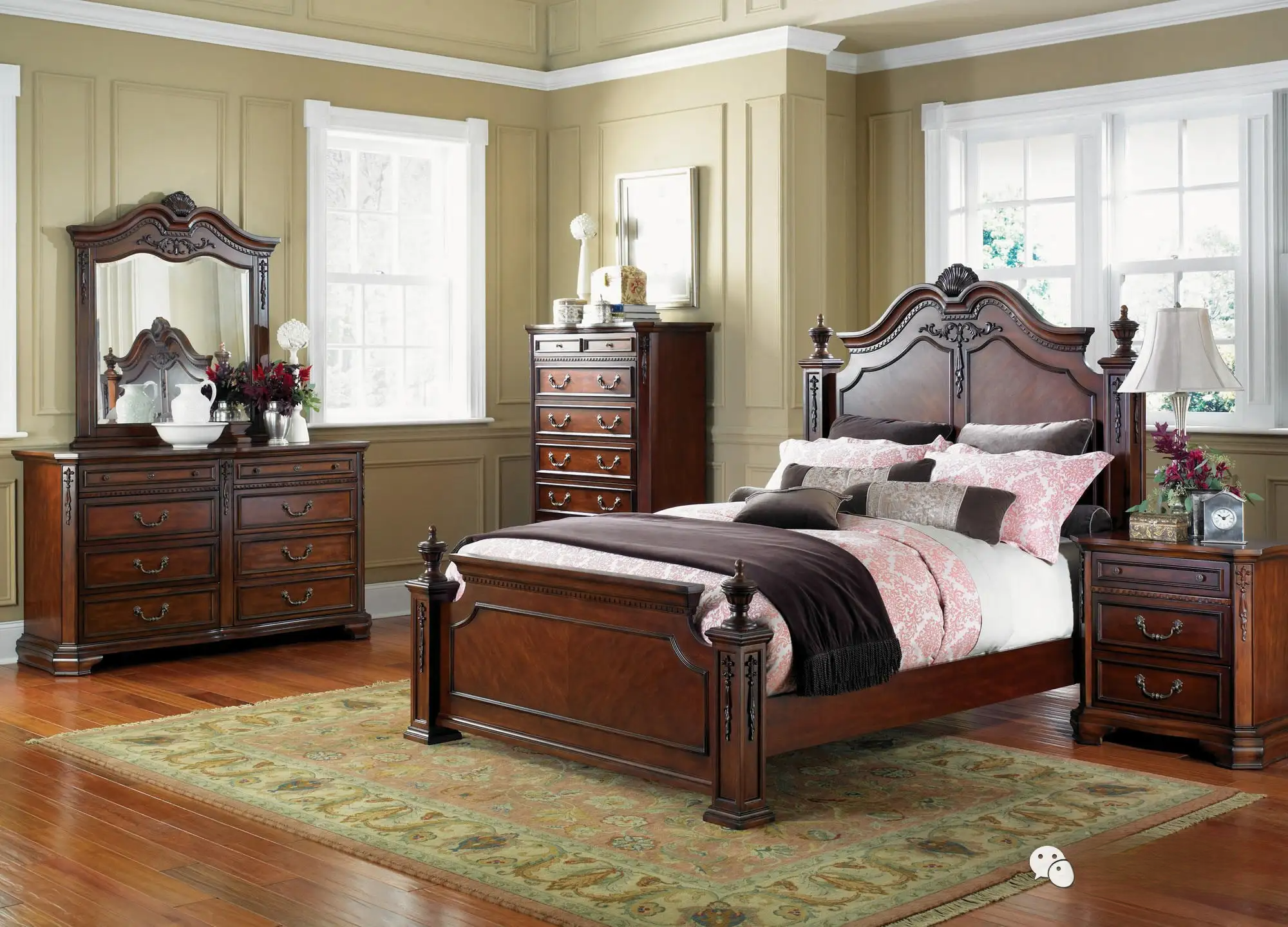
The bed should be the center of the bedroom. Generally speaking, a bed facing north and south is the most ideal orientation, aligning with the Earth's stronger magnetic field in the north. A bed facing west and east is second best, catching the eastern purple energy. A bed facing south and north is third, and east and west is the least ideal. Wardrobe placement also requires careful consideration.
Wardrobes are one of the largest pieces of furniture in a bedroom, occupying a significant amount of space. Traditional culture holds that the layout of a bedroom best reflects the harmony of family relationships. The wardrobe in a bedroom is particularly important. A well-placed wardrobe can bring peace and tranquility to the owner, while an inappropriate layout can evoke an inexplicable melancholy. In bedrooms with bathrooms, if the bathroom door faces the bed, a wardrobe can be used to create a barrier. The turbulent airflow from plumbing pipes and toilets, coupled with excessive humidity, can easily affect one's health. Using a wardrobe to create separation can create a harmonious aura in the bedroom and promote emotional balance.
Because a dressing table is used by women and is yin in nature, it should be placed to the right of the bed in the White Tiger position, also yin. This harmony between the two positions aligns with the principles of yin and yang. If a dressing table is placed to the right of the bed, a taller piece of furniture should be placed to the left. Wardrobes, typically taller in shape, should be placed to the left of the bed, aligning with the yang energy of the Green Dragon position and placing them higher than the dressing table in the White Tiger position. This way, the bedroom maintains a strong yang energy, ensuring prosperity and wealth.
However, be careful to avoid wardrobes with mirrors. Some wardrobes come with a large dressing mirror on the outside. Traditional culture holds that wardrobe mirrors should not face the headboard, as this can negatively impact sleep. Mirrors should also not face the bedroom window, as this can clutter the light, creating an unfavorable aura and disturbing peace of mind. Furthermore, mirrors should not face the bedroom door. Traditionally, a mirror facing the door is typically reserved for public spaces like government offices and schools. In private spaces like the bedroom, a mirror facing the door symbolizes a potential intrusion.
In addition, it is best to place the wardrobe some distance away from the bed. Firstly, this will facilitate the occupant's daily life and avoid bumps when getting in and out of bed; secondly, there should not be any objects that give a sense of oppression above the bed, so that the person resting in bed can be physically and mentally comfortable. Because the wardrobe is tall, it is not suitable to be placed close to the bed, so as to avoid creating a sense of oppression when the bedroom owner rests, which is detrimental to their daily life and rest, and thus affects their physical and mental health.
Alternatively, some owners will create a separate area within a larger bedroom as a dressing room. The biggest taboo regarding this large "wardrobe" is storing old books and other miscellaneous items inside. Because the dressing room is small, ventilation is often poor. If it's cluttered and messy, long-term conditions can create a damp atmosphere, affecting the airflow in the bedroom, which in turn can affect the owner's mood and even their ability to think rationally. Wardrobes should not have too many drawers. If a dressing mirror in a dressing room faces the door, it can be easy to startle someone when opening the door. Placing a knee-high plant in front of the mirror can mitigate this problem.
A bright living space is essential for a positive mood. The choice and layout of your bedroom wardrobe can be influenced by the bedroom's orientation. If your bedroom's doors and windows face north, where light and ventilation are limited, a light-colored wardrobe is best. Place your wardrobe in a dark corner, away from windows or the bedroom door. This prevents the wardrobe from blocking light and darkening the bedroom. If your bedroom has good light and ventilation, the wardrobe's color palette isn't as critical, but avoid wardrobes with excessive reflective metal or glass inlays.
Furthermore, the bedroom is a place for rest and requires a tranquil environment. Therefore, the simpler the function, the more tranquil the dwelling. The current expansion of housing and improvements in people's quality of life have created the prerequisites for achieving this goal. Consequently, more and more families are abandoning other functions that interfere with sleep, such as the bedroom serving as a study, storage room, or even a dining room, making sleep the bedroom's primary function.
However, be careful to avoid wardrobes with mirrors. Some wardrobes come with a large dressing mirror on the outside. Traditional culture holds that wardrobe mirrors should not face the headboard, as this can negatively impact sleep. Mirrors should also not face the bedroom window, as this can clutter the light, creating an unfavorable aura and disturbing peace of mind. Furthermore, mirrors should not face the bedroom door. Traditionally, a mirror facing the door is typically reserved for public spaces like government offices and schools. In private spaces like the bedroom, a mirror facing the door symbolizes a potential intrusion.
In addition, it is best to place the wardrobe some distance away from the bed. Firstly, this will facilitate the occupant's daily life and avoid bumps when getting in and out of bed; secondly, there should not be any objects that give a sense of oppression above the bed, so that the person resting in bed can be physically and mentally comfortable. Because the wardrobe is tall, it is not suitable to be placed close to the bed, so as to avoid creating a sense of oppression when the bedroom owner rests, which is detrimental to their daily life and rest, and thus affects their physical and mental health.
Alternatively, some owners will create a separate area within a larger bedroom as a dressing room. The biggest taboo regarding this large "wardrobe" is storing old books and other miscellaneous items inside. Because the dressing room is small, ventilation is often poor. If it's cluttered and messy, long-term conditions can create a damp atmosphere, affecting the airflow in the bedroom, which in turn can affect the owner's mood and even their ability to think rationally. Wardrobes should not have too many drawers. If a dressing mirror in a dressing room faces the door, it can be easy to startle someone when opening the door. Placing a knee-high plant in front of the mirror can mitigate this problem.
A bright living space is essential for a positive mood. The choice and layout of your bedroom wardrobe can be influenced by the bedroom's orientation. If your bedroom's doors and windows face north, where light and ventilation are limited, a light-colored wardrobe is best. Place your wardrobe in a dark corner, away from windows or the bedroom door. This prevents the wardrobe from blocking light and darkening the bedroom. If your bedroom has good light and ventilation, the wardrobe's color palette isn't as critical, but avoid wardrobes with excessive reflective metal or glass inlays.
Furthermore, the bedroom is a place for rest and requires a tranquil environment. Therefore, the simpler the function, the more tranquil the dwelling. The current expansion of housing and improvements in people's quality of life have created the prerequisites for achieving this goal. Consequently, more and more families are abandoning other functions that interfere with sleep, such as the bedroom serving as a study, storage room, or even a dining room, making sleep the bedroom's primary function.
The bedroom is the most important room in a family. One-third of a person's life is spent in his or her bedroom. Therefore, the feng shui and taboos of the placement of materials and bedroom fixtures are particularly important. The taboos on furniture placement hope to help everyone understand whether their home layout complies with the taboos on furniture placement. If there are problems mentioned in the paint, you can optimize it according to the above process.
- A collection of design articles/case studies. Click on the following keywords to view the collection .
/////////